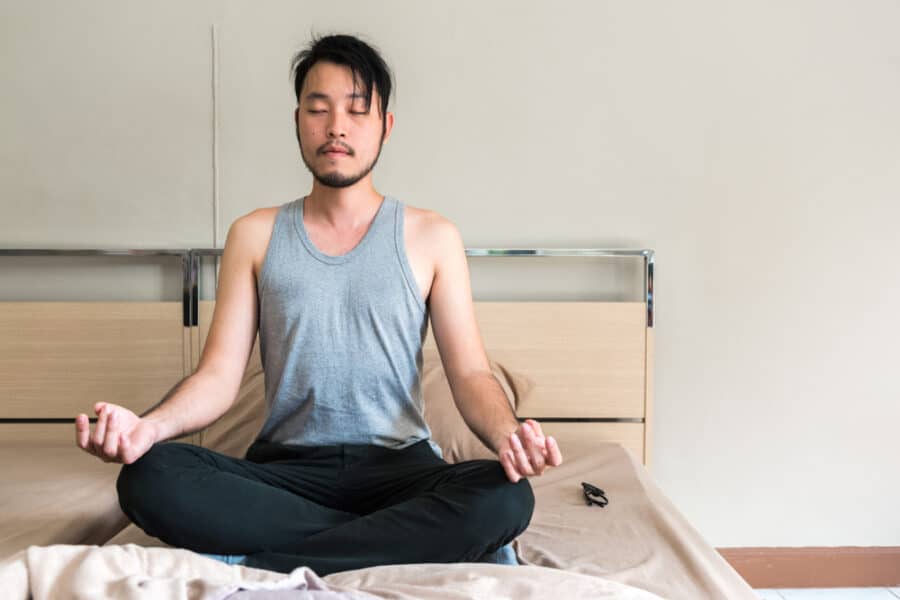
Meditation for Sleep: The Ultimate Guide
Meditation for Sleep: The Ultimate Guide
Millions of people around the world suffer from sleep disorders. Insomnia, restless leg syndrome, and sleep apnea are just a few conditions that can make it challenging to get a good night’s sleep. If you’re one of these people, you know how frustrating it can be to try every remedy under the sun without finding relief.
Relaxation techniques like meditation can be helpful for those who have trouble sleeping, but not all forms of meditation are created equal. In this article, we will explore the benefits of guided sleep meditation and provide a step-by-step guide on how to get started!

Guided Sleep Meditation Techniques
There are a few things to consider if you’re looking for guided meditation techniques. First, what is your goal? Are you looking to force sleep? Or are you hoping to achieve deep, restful sleep? Different techniques can be used for each of these goals.
Next, consider what type of asleep meditation you’d like to try. There are many different types of guided sleep meditation, including guided visualization, progressive muscle relaxation, and guided breathing. Choose the type of deep sleep meditation you feel most beneficial.
Finally, consider how long you want to spend on your guided meditation. If you’re looking for a quick way to fall asleep, you may choose a guided sleep meditation that is only a few minutes long. However, if you’re hoping to achieve deep, restful sleep, you may want to choose a guided meditation that is longer in duration.
Once you’ve considered these factors, it’s time to choose a guided sleep meditation technique that is right for you. Try out a few different techniques and find the one that works best. With regular practice, you’ll be able to achieve deep, restful sleep and wake up feeling refreshed and energized.
Guided Meditation for Sleep Music – YouTube Sleep Meditation

We often think of sleep as an unconscious state, but it’s a very active period when a lot is going on in our brains. Sleep is vital for our physical and mental health, yet most of us don’t get enough of it. In fact, according to the National Sleep Foundation, 50-70 million US adults have a sleep disorder.
You can do many things to improve your sleep, but meditation is one of the most effective. Meditation practice is an effective treatment for insomnia and can help you get better sleep quality.
If you’re new to meditation, starting with a guided meditation for sleep can be helpful. Guided sleep meditations are led by a narrator who walks you through the meditation. They can be accommodating if you’re not sure how to meditate or if you want someone to guide you through the process.
There are many guided meditations for quality sleep, so it’s essential to find one that resonates with you. Once you find a guided meditation, you can listen to it every night before bed.
If you’re having trouble falling asleep, try a body scan meditation. This meditation focuses on each part of your body, from your toes to your head. As you focus on each part of your body, breathe deeply and let go of any tension you’re holding.
Try mindfulness meditation if you wake up in the middle of the night and can’t fall back asleep. This meditation helps you focus on the present moment and let go of any thoughts that keep you awake.
There are many other types of sleep meditation, so explore until you find one that works for you. Remember to be patient and consistent with your practice. Meditation is a skill that takes time to develop, but it’s well worth the effort.
Physical or Mental Illness

Meditation can be an effective treatment for both physical and mental illnesses. It can help to improve sleep, reduce stress, and increase overall well-being. Meditation can help ease pain and other symptoms for those with physical illnesses. For those with mental illnesses, meditation can help to reduce anxiety and depression. There are many different types of meditation, so it is essential to find one that works best for you.
When we meditate, our mind often wanders. This is normal and expected. The goal of meditation is not to clear our mind of all thoughts but rather to focus on a single thought or object. As our mind wanders, we simply redirect our focus back to our chosen object of meditation. Over time, with practice, we can train our minds to focus for more extended periods.
There are many benefits of meditation, including improved sleep. When we meditate, we slow our breathing and heart rate. This can lead to a more resounding, more night’s rest will follow. Meditation can also help to ease physical sensations, such as pain or tension. For those with mental illnesses, meditation can help to reduce anxiety and depression.
Many resources are available if you are interested in trying meditation for sleep. There are many different types of meditation, so it is essential to find one that works best for you. Some people prefer to meditate with guidance from a teacher or audio recording. Others prefer to meditate on their own.
Fall Asleep Faster with these Tips
Meditation might be the answer if you’re struggling to get the sleep you need. Though it’s not a cure-all, it can be an effective way to calm the mind and relax the body so that sleep comes more easily.
There are many different types of meditation, so it’s essential to seek professional medical experts to help you find the right one. Some people find that mantra-based meditation helps them fall asleep, while others prefer breath-based or mindfulness meditation.
Whatever type of meditation you choose, make sure it’s something you can commit to doing every night. Dedicate a specific time and place for your practice, and try to avoid distractions as much as possible.
When you’re ready to meditate, find a comfortable position and close your eyes. Focus on your breath and allow yourself to relax into the practice. If intrusive thoughts or sensations arise, simply acknowledge them and let them go. Return your focus to your breath and continue meditating.
If you stick with it, you’ll likely find that meditation helps you sleep more quickly and stay asleep throughout the night. Good sleep is essential for our overall health and well-being, so don’t hesitate to try meditation!
Here are a few tips for incorporating meditation into your sleep routine:
1. Establish a routine. Try to meditate at the same time each night. This will help your body and mind get into the habit of relaxing and falling asleep.
2. Find a comfortable place to sit or recline. You may want to try different positions until you find one that is most comfortable for you.
3. Breathe deeply. When you inhale, focus on drawing in air through your nose and filling your lungs. Hold your breath for a few seconds, then release it slowly through your mouth. Repeat this process several times.
4. Clear your mind. Don’t focus on specific thoughts or images; let your mind relax and wander freely.
5. Stay relaxed. Don’t tense up your muscles or stress about falling asleep. Just let go and relax completely.
Consistent practice is key to getting the most out of meditation for sleep. Try to meditate every night for at least 10 minutes, and gradually increase the duration as you get more comfortable with the practice. If you find it difficult to meditate on your own, many professional help and resources are available. Don’t hesitate to seek out guidance if you need it.
FAQ
What is the best type of meditation for sleep?
There are many different types of meditation, and each one can be helpful for sleep in its way. Some people find that mindfulness meditation, which involves focusing on the present moment, helps them fall asleep.
How can I meditate to sleep?
There are many ways to meditate for sleep. The most important thing is to find a method that works for you. Some people prefer to meditate in bed, while others find sitting in a comfortable chair helpful. There are also guided meditation programs available online or through app stores.
Is meditating while sleeping good?
The answer is a resounding yes! Meditation can be incredibly effective for getting a good night’s sleep. Meditation is one of the most popular bedtime activities worldwide.
There are many different ways to meditate, but the basic idea is to focus on something calming, such as your breath or a mantra, and let go of any other thoughts running through your head.
How can I fall asleep in 10 minutes?
There are a lot of things that you can do to fall asleep in ten minutes. One of the most effective methods is to meditate. Meditation has been proven to be an effective way to fall asleep quickly.
When you meditate, you focus your attention on your breath. You inhale and exhale deeply and slowly. This helps to relax your body and mind. It also helps to clear your thoughts and calm your mind.
Another benefit of meditation is that it helps to lower your stress levels. Stress can keep you awake at night and make it difficult to fall asleep. By meditating, you can help to reduce your stress levels and improve your sleep quality.














